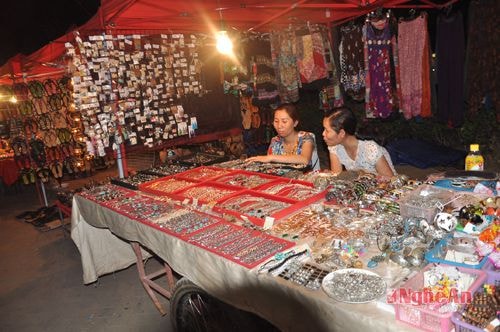Difficulty in protecting citizens against illegal workers
(Baonghean) - The situation of illegal labor abroad not only poses many risks to the workers themselves, but also causes many difficulties in protecting citizens when incidents occur...
According to statistics and reviews by competent authorities, in the border area of Nghe An province, from 2010 to present, there have been 270 households/1,058 people illegally migrating to Laos; 1,362 people illegally exporting labor to China; for cases of illegal exit to Australia, from 2013 to present, there have been 94 cases of Nghe An people being returned by the Australian government. In addition, there is the situation of illegal exit, illegal labor to countries such as the UK, Canada, Angola, Thailand, illegal labor in Korea... (Incomplete statistics of the Provincial Police in 2014, the number of citizens in the area going to other countries to work freely was about 9,822 people).
Mr. Giang Cong Huy, Head of the Border Consular Department (Department of Foreign Affairs) said: The number of illegal workers accounts for more than 35% of the total number of Nghe An people residing and working abroad. Through information exploitation from people who were deported by foreign countries, citizens residing in European countries were taken to refugee camps and treated well by the host country's authorities; while in Asian, African, and American countries, the process of living and working is very difficult, income is low, and there is little concern about health and working conditions; especially for citizens arrested and returned by China, they have to go through a very difficult process of working and living, and many people have to pay back a certain amount of money before being deported back to their country.
 |
| Vientiane night market (Laos) has many Vietnamese workers coming here with tourist passports or to visit relatives to make a living. |
In 2014 and the first quarter of 2015, the Nghe An Department of Foreign Affairs coordinated with the Consular Department - Ministry of Foreign Affairs and relevant agencies to urge and link information with localities to resolve 30 cases related to 77 citizens of Nghe An living abroad, mainly those who illegally migrated, entered, exported labor or organized illegal border crossings and were detained by countries, requested to be deported or tried, and imprisoned (mainly China). The Department supported and helped contact local authorities and families of the subjects to inform them of the situation, and instructed relatives to contact the Consular Department - Ministry of Foreign Affairs or the Vietnamese Embassy in the countries to carry out necessary procedures to bring citizens back to the country, contributing to protecting the legitimate rights and interests of citizens.
However, the phenomenon of people voluntarily or through brokers going to some countries such as Angola, Japan, Korea, Australia, Canada, Eastern European countries, etc. to work without a labor contract and illegally residing in the form of traveling, visiting relatives or fake marriages, etc. has caused damage to the workers themselves and caused many difficulties in protecting the legitimate rights and interests of citizens abroad. For example, in cases of illegal workers, illegal workers who unfortunately have work accidents, get sick, or are violated, etc., because they do not have a legal labor contract, they will not be guaranteed insurance regimes, policies, and related benefits. In many cases, the employer also oppresses them, withholds wages, owes them wages, and does not allow them to enjoy insurance or policies on workers in accordance with the law.
In cases of murder or death due to illness, identifying the identity and intervening to bring the body back to the hometown also encounters many difficulties. For example, in the case of Nguyen Cong Nguyen (Tan Dien block, Nghi Hoa ward, Cua Lo town), because he followed the unofficial labor export route until he got malaria and died in Angola, no one took care of it, it took the intervention of the Embassy and the amount of money donated by benefactors up to billions of VND, his body was brought back to his hometown. "The procedure process is also very complicated and time-consuming...", Mr. Nguyen Cong Hop, Nguyen's father shared. Or the situation of Nguyen Van Ngoc (Hamlet 6, Nghi Tan ward, Cua Lo town) is also a heartbreaking story. Ngoc can now only tell about his 6 years of wandering in Thailand with broken words, sometimes remembering, sometimes forgetting due to the consequences of the tragic accident when he went to Thailand to work illegally. Cuong (village 2), Ngoc's best friend who had been in Bangkok for only 3 hours, died on the spot. They were close friends back home, so as soon as they arrived in Thailand, Ngoc took her friend to find a job. Ngoc said: My friend and I were on the road when we were hit by a car, then the driver fled, but we didn't dare to hold them responsible because we were illegal workers. Ngoc's mother ran everywhere, even to the Vietnamese Embassy in Thailand to ask for help. After that, luckily, there were quite a few Vietnamese people there, seeing the pitiful situation of Ngoc and her son, they donated money to help Ngoc get through the disaster and bring her friend's body back to her hometown.
Therefore, in addition to solutions such as: Promoting propaganda and widely disseminating the Party's policies and the State's laws on labor export, diversifying training forms, disseminating and implementing legal documents, treaties and international agreements related to the protection of Vietnamese citizens abroad to cadres, civil servants, public employees and citizens. Synchronously implementing solutions and policies to protect Vietnamese workers working, studying and living abroad. Strengthening the coordination mechanism and information exchange between domestic and foreign authorities to serve the timely protection of citizens... Workers themselves need to be aware of respecting the laws of the host country during the entry and residence process. Because after all, workers also represent the image and prestige of a country and a locality.
Khanh Ly






